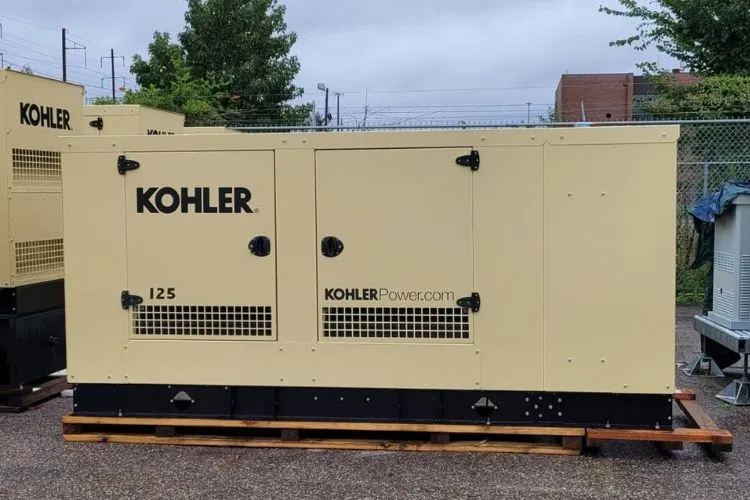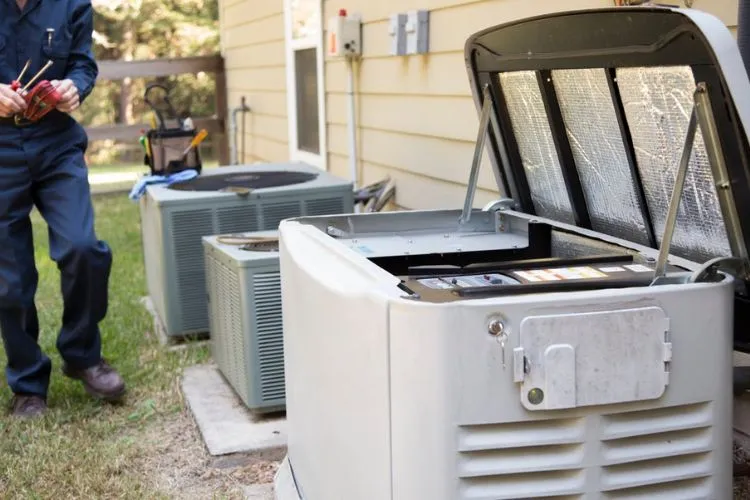In the quest for sustainable and reliable power solutions, natural gas generators have emerged as a noteworthy option for many homeowners.
This article delves into the essentials of natural gas generators, touching upon their benefits, drawbacks, and the overall value they offer. Are natural gas generators worth It? Let’s learn.

Are Natural Gas Generators Worth It?
Natural gas generators provide electricity by burning natural gas. Unlike their gasoline or diesel counterparts, they tap into the existing natural gas supply.
This makes them a convenient option for areas with accessible natural gas lines. Types of natural gas generators vary, ranging from small portable units to large standby models that can power an entire home.
Advantages of Natural Gas Generators
The appeal of natural gas generators lies in their distinct set of benefits. First, they are cost-effective in areas with an ample natural gas supply. The operational costs are often lower compared to generators that use other fuels. This is a key consideration for long-term savings.
Reliability is another significant plus. Natural gas pipelines are less susceptible to disruptions caused by severe weather or other disasters. This ensures a steady fuel supply.
From an environmental perspective, natural gas burns cleaner than gasoline or diesel. It releases fewer pollutants, making it a more environmentally friendly choice. Furthermore, natural gas generators operate quietly, reducing noise pollution.
Lastly, the convenience of fuel supply and storage is undeniable. There’s no need for manual refueling, and the risks associated with storing large quantities of fuel are eliminated.
Disadvantages of Natural Gas Generators
Despite their advantages, natural gas generators have limitations. Initial costs can be high. The installation involves setting up a connection to the household’s natural gas supply, which can add to the expense.
Maintenance is crucial to ensure efficiency and long-term reliability. This includes regular checks and occasional part replacements, which can add to the overall running costs.
Dependency on the natural gas infrastructure is a potential drawback. In areas without an existing gas line, installation might not be feasible. Moreover, during widespread disasters that impact the gas supply, these generators become ineffective.
You may also find useful: Are Diesel Generators Better Than Petrol Generators?
Cost-Benefit Analysis
When weighing the advantages against the disadvantages, a cost-benefit analysis is essential. The key is to measure the upfront investment against the long-term operational savings.

Comparing natural gas generators to alternatives like gasoline, diesel, or solar generators is crucial for a balanced view. Those living in areas with stable natural gas supply will find the most value in these generators.
User Experiences and Reviews
Real-world experiences can offer valuable insights. Users often highlight the reliability and ease of use as major benefits.
However, some point out the high initial setup cost as a drawback. Sifting through user reviews provides a rounded understanding of what to expect.
Environmental Concerns and Natural Gas
Environmental impact is a growing consideration. Natural gas, while cleaner than other fossil fuels, still contributes to greenhouse gas emissions.
It’s essential to weigh this factor against the benefits of reduced air pollutants and noise pollution.
Making Your Decision
Deciding if a natural gas generator is right for you depends on several factors. Consider the availability of natural gas in your area, your power needs, and your environmental priorities. Assessing the long-term cost efficiency against the initial investment is crucial.
Finally, understanding how a natural gas generator would integrate into your home’s energy setup is important. For some, it may serve as a primary power source, while for others, it might be a backup solution.
Lifecycle and Maintenance Comparison
When evaluating natural gas generators against alternatives fueled by diesel or gasoline, it’s crucial to consider not just the initial purchase and installation costs but also the long-term operational and maintenance implications.
Natural gas generators often come with a higher upfront price tag; however, they typically benefit from lower running costs. This is due in part to the more stable and generally lower price of natural gas compared to diesel or gasoline.

Furthermore, the nature of natural gas combustion results in cleaner operation, which can lead to less wear and tear on the generator’s engine and components, potentially extending its lifespan.
Regular maintenance schedules might also be less demanding, further contributing to cost savings over time. These factors combine to make natural gas generators a potentially more economical option in the long run, despite their initial cost.
Future Trends in Energy
The energy landscape is undergoing a significant transformation influenced by technological advancement and environmental awareness:
- Renewable Integration: Innovations in generator technology are increasingly incorporating renewable energy sources. Solar and wind power capabilities, coupled with battery storage, are becoming more feasible for residential and commercial backup power, potentially reducing the demand for natural gas generators.
- Hybrid Systems: The development of hybrid systems that combine natural gas with renewable energy could alter the attractiveness of standalone natural gas generators. These systems can offer the best of both worlds: the reliability of natural gas and the sustainability of renewables.
- Government Policies: Legislation aimed at reducing carbon emissions could influence future trends. As governments incentivize cleaner energy sources and technologies, natural gas may face competition or need to adapt to stay relevant.
- Technological Advances: Breakthroughs in hydrogen fuel cells and other clean energy technologies might challenge the dominance of natural gas generators by offering competitive alternatives that are both efficient and have lower environmental impacts.
These trends suggest that while natural gas generators currently offer a practical solution, the shift towards renewables and the innovation in energy technology could reshape their role in the energy mix over time.
Frequently Asked Questions (fAQs)
Are natural gas generators more reliable than traditional generators?
Yes, in areas with a stable natural gas supply, they tend to be more reliable due to the direct gas line connection.
How much does a natural gas generator typically cost?
Prices vary widely based on size and model but expect higher initial costs compared to some other generator types.
What are the main considerations when installing a natural gas generator for home use?
Consider the availability of a natural gas line, the size of the generator needed, and the installation’s environmental impact.
Can a natural gas generator power an entire house?
Yes, larger standby models are designed to power an entire house, offering a seamless supply during outages.
Practical Considerations for Natural Gas Generator Ownership
While natural gas generators offer a range of benefits, it’s important to think about practical aspects when integrating one into your home. The size and capacity of the generator are key considerations.
Depending on your home’s energy consumption and the number of appliances you wish to power during an outage, you may need a larger or more specialized unit.
For smaller homes, portable natural gas generators can suffice, offering an economical solution for basic power needs. However, for larger households or those with extensive power demands, a whole-house standby generator may be required.
These systems are more expensive, but they provide seamless power transfer during outages and can run continuously as long as the natural gas supply remains intact.
Long-Term Operational Costs and Efficiency
Natural gas generators are known for their energy efficiency. They often operate at a higher efficiency level compared to gasoline or diesel generators, meaning they produce more power per unit of fuel burned. Over time, this results in lower fuel consumption and, consequently, lower operating costs.
Another benefit of these generators is their relatively low maintenance requirements. As mentioned earlier, because natural gas burns cleaner than gasoline or diesel, there is less buildup of carbon deposits and other residues in the engine.
This means fewer breakdowns and a longer lifespan for your generator, potentially saving money on repairs and replacements in the future.
Evaluating Natural Gas Supply and Infrastructure
In some regions, natural gas infrastructure may not be fully developed, making it challenging to install a natural gas generator.
Before making a purchase, ensure that a reliable gas supply is available and that you can safely connect the generator to your home’s gas line. This can involve some upfront costs for installation, but it ensures the generator can function efficiently over its lifespan.
Conclusion:
Natural gas generators offer a balanced mix of reliability, cost efficiency, and environmental benefits. However, the value they provide varies based on individual circumstances.
By examining the pros and cons and performing a thorough cost-benefit analysis, homeowners can make an informed decision that aligns with their energy needs and values.
